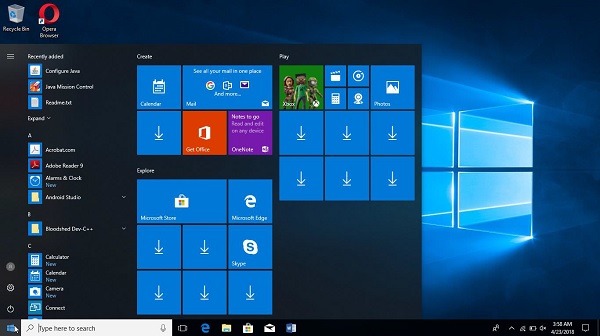
- Computer Concepts Tutorial
- Computer Concepts - Home
- Introduction to Computer
- Introduction to GUI based OS
- Elements of Word Processing
- Spread Sheet
- Introduction to Internet, WWW, Browsers
- Communication & Collaboration
- Application of Presentations
- Application of Digital Financial Services
- Computer Concepts Resources
- Computer Concepts - Quick Guide
- Computer Concepts - Useful Resources
- Computer Concepts - Discussion
Basics of Popular Operating Systems
Basics of Popular Operating Systems (Windows, LINUX)
We shall discuss about the basic of Operating Systems in this section −
Windows Operating System
Windows operating system is developed by Microsoft Corporation. It provides Graphical User Interface (GUI), multitasking capability to users. It also provides virtual memory management and several peripheral devices. According to statistics, about 90% of computers have migrated to Windows operating system.

Versions of Windows Operating System
| Windows Server Version | Code Name | Launch Date | Kernel Version | CPU Speed | Min Disk | Min Memory |
|---|---|---|---|---|---|---|
| Windows for Workgroups 3.1 | Sparta | Oct-92 | 3.1 | 25 MHz | 10.5 MB | 3 MB |
| Windows for Workgroups 3.1 | Snowball | Nov-93 | 3.11 | 25 MHz | 10.5 MB | 3 MB |
| Windows for NT 3.1 Advanced Server | NT OS/2 | Aug-93 | NT 3.10 | 25 MHz | 90 MB | 16 MB |
| Windows for NT 3.5 Server | Daytona | Sep-94 | NT 3.5 | 25 MHz | 90 MB | 16 MB |
| Windows for NT 3.51 Server | Daytona | Jun-95 | NT 3.51 | 25 MHz | 90 MB | 16 MB |
| Windows for NT 4 Server | Cairo | Jul-96 | NT 4.0 | 33 MHz | 150 MB | 32 MB |
| Windows 2000 Server | Janus | Feb-00 | NT 5.0 | 133 MHz | 1000 MB | 128 MB |
| Windows Server 2003 | Whistler | Apr-03 | NT 5.2 | 400 MHz | 1500 MB | 512 MB |
| Windows Server 2003 R2 | R2 | Mar-06 | NT 5.2 | 400 MHz | 1500 MB | 512 MB |
| Windows Server 2008 | Longhorn | Feb-08 | NT 6.0 | 1000MHz | 20,000MB | 512 MB |
| Windows Server 2008 R2 | Server 7 | Oct-09 | NT 6.1 | 1400MHz | 32,000MB | 512 MB |
| Windows Server 2012 | Server 8 | Sep-12 | NT 6.2 | 1400MHz | 32,000MB | 512 MB |
| Windows Server 2012 R2 | Blue | Oct-13 | NT 6.3 | 1400MHz | 32,000MB | 512 MB |
| Windows Server 2016 | Redstone | Sep-16 | NT 10.0 | 1400MHz | 32,000MB | 512 MB |
Linux Operating System
Linux is a multitasking operating system that supports various users and numerous tasks. It is open source, i.e., code for Linux is available for free of cost. Linux can run on any computer and support almost any type of application. Linux uses command-line interface. It also supports windows based GUI environment, called "shells". The most popular Linux vendors are Red Hat and Novell. Some of the Linux versions include Ubuntu, Fedora, Linux Mint, etc.

To Continue Learning Please Login